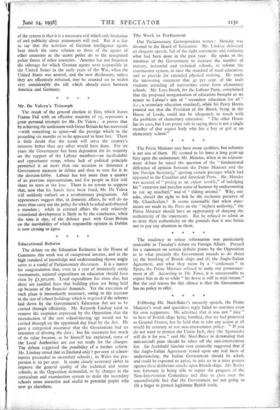The debate on the Education Estimates in the House of
Commons this week was of exceptional interest, and in the high standard of knowledge and understanding shown might serve as a model of Parliamentary discussion. It is a matter for congratulation that, even in a year of immensely costly rearmament, national expenditure on education should have risen by £1,5oop00. Local expenditure has risen also, but there are justified fears that building plans are being held up because of the financial demands. Yet the execution of such plans is immediately necessary, owing to the increase in the size of school buildings which is required if the reforms laid down by the Government's Education Act are to be carried through efficiently. Mr. Kenneth Lindsay tried to remove the suspicion expressed by the Opposition that the introduction of the new school-leaving age would not be carried through on the appointed day fixed by the Act. He gave a categorical assurance that the Government had no intention of altering the date ; but his statement lost much of its value because, as he himself has explained, some of the Local Authorities are not yet ready for the changes. The debate suggested the possibility of a further reform. Mr. Lindsay stated that in Enoland only 7 per cent of school- leavers proceeded to secondary schools ; in Wales the pro- portion is 20 per cent. It seems clearly necessary either to improve the general quality of the technical and senior schools, as the Opposition demanded, or by changes in the curriculum and examination system to make the secondary schools more attractive and useful to potential pupils who now go elsewhere.














































 Previous page
Previous page